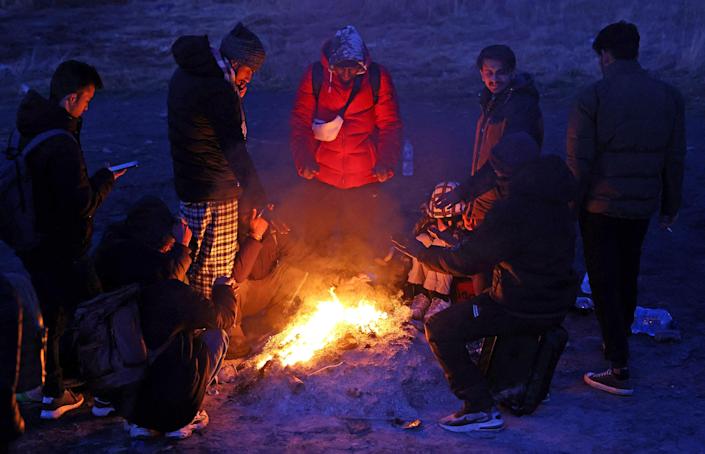MEDYKA, Poland — Lost in a crowd of thousands fleeing a war, Svetlana Katsi searched for a woman she’s never met.
She and her son, Daniel, 9, were at the Ukraine-Poland border waiting to meet up with a volunteer who had offered to give them shelter.
But Katsi, 28, and her son weren’t meant to be traveling alone. They left home with her husband and both got caught in traffic for 20 hours. After their car moved only three miles, Katsi decided to take Daniel and travel to the border on foot.
They walked about three hours to get to Medyka, wheeling a suitcase.
“In one day, I have no home,” she said, her voice shaking earlier this week. “And I don’t know where my husband is.”


Katsi is part of a growing wave of people fighting to flee Ukraine. The United Nations refugee agency on Monday said that 500,000 refugees have left Ukraine to Poland, Hungary, Romania, Moldova and other countries since Russia invaded Ukraine and began bombing and shelling cities across the country. Up to 4 million Ukrainians could end up refugees, according to the agency.
Medyka is where people whose lives have fallen apart come to begin to stitch them together.
Volunteers have set up stalls for food, water, diapers and clothing. In front of a table offering meat and rice, a man holds a baby drinking a bottle of milk.
Another man walks by dragging a blue carry-on in one hand and a baby stroller with a bag of diapers in the other.
As a bus carrying dozens of people, including children, drives away, a woman yells at a police officer, asking why she could not get on.


“What you guys are doing here, this is not the job of a country that is showing itself that they are helping refugees coming from Ukraine,” she says. “We walked 50 kilometers to come here, you’re treating us like this.”
The police officer replies, “Because I told you, first mother and children.”
“What if I’m pregnant?” she responds.
Across the road, a First Aid tent has been set up with paramedics and two ambulances standing by.
Ikram Kaboury, 19, a medical student from Algeria who was studying in Kyiv, said the earliest she could get a train ticket heading west was four days.
So she took a taxi with a friend from Kyiv, the capital city, to the western city of Lviv and then walked dozens of miles to the border.
She said she thought the prospect of an invasion was a joke but realized she needed to leave when Russian troops started entering the country.
“I was really planning to be a successful doctor,” she said. “I slept, I woke up and … you’re not going to school, you have to go, you have to pack your bags. This is a feeling I can’t describe.”
She said she planned to stay in Poland for several days, then head back to Algeria and did not know what she would do afterward.
In the nearby town of Przemysl, dozens of people gathered outside a bus carrying refugees, holding up signs of cities they were offering to drive them to for free.
At one point, a man yelled out, “Germany!”


Hundreds more refugees were at the train station, some resting on cots, others getting free SIM cards.
About 150 miles west in the city of Krakow, volunteers along with the local government had set up a reception center for refugees at the train station.
Yustyna Bahai, 18, a university student from Lviv in western Ukraine, was volunteering here but she said she would rather be home with her parents even though the shelling had gotten closer to their home.
“It’s far away from Russia. We don’t expect that,” she said.
Bahai said about 200 people had arrived at the reception center on Sunday and 1,800 more were expected by Monday.
She said many were going to smaller villages where people were offering to host refugees but some went on trains headed as far away as Prague and Amsterdam.
As for Katsi, from the southeastern Ukrainian city of Zaporizhia, she said she simply hoped to find a safe place to work and support her family in Poland.
“In Zaporizhia, we don’t have work now,” she said. “We have war, we have war in the 21st century in Europe.”




